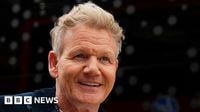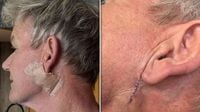Gordon Ramsay, the famously fiery chef and television personality, has revealed that he recently underwent surgery to remove basal cell carcinoma, a form of non-melanoma skin cancer, from the side of his face. The 58-year-old Michelin-starred restaurateur shared the news on Instagram on August 30, 2025, posting a photo that showed a stitched-up scar just below his ear. Alongside the image, Ramsay expressed deep gratitude to his medical team, writing, “Grateful and so appreciative for the incredible team at The Skin Associates and their fast reactive work on removing this basal cell carcinoma, thank you!”
Ramsay’s announcement wasn’t just a personal health update. He used the opportunity to urge his fans and followers to take sun protection seriously. “Please don’t forget your sunscreen this weekend,” he reminded, adding a touch of humor to lighten the mood: “I promise you it’s not a face lift! I’d need a refund.” According to Sky News, the post quickly drew a wave of support from fans and celebrities alike, with TV judge Robert Rinder responding with a heart emoji and Ramsay’s daughter Holly sending her love as well.
The chef’s openness about his diagnosis and treatment struck a chord across social media, with many praising him for raising awareness about the dangers of skin cancer and the importance of sun safety. Cancer Research UK chimed in with a message of encouragement and a crucial reminder: “Glad to hear you’re doing well, Gordon, and thanks for raising awareness of how important it is to stay safe in the sun. Seek shade, cover up, and apply sunscreen regularly and generously.”
Basal cell carcinoma (BCC) is the most common type of skin cancer, accounting for the majority of non-melanoma cases worldwide. According to the NHS, BCC develops in the basal cells located in the outermost layer of the skin and is primarily caused by prolonged exposure to ultraviolet (UV) radiation from either the sun or tanning beds. The risk is notably higher for individuals over 50, those with fair skin and light eyes, and people with a history of previous skin cancers. The cancer typically appears as a small, shiny bump or a scaly, flat patch that grows slowly over time. It’s most frequently found on areas of the body that are regularly exposed to sunlight, such as the face, neck, head, and ears.
Ramsay’s case is a stark reminder that even those who appear robust and energetic aren’t immune to the effects of sun damage. As The Independent reported, the chef’s willingness to share his experience comes at a time when misinformation about sunscreen is spreading online, with some social media influencers questioning its safety. One fan, responding to Ramsay’s post, wrote, “So important to share things like this, slap on a hat, suncream and seek shade, happy healing, well done to the amazing people who work in healthcare.” Another commenter addressed the so-called “anti-sunscreen movement,” stating, “Science backs up the use of it, and science saves lives.”
The statistics are sobering. According to Cancer Research UK, 85% of melanoma cases (the most dangerous form of skin cancer) are caused by overexposure to UV radiation. The organization’s analysis also reveals that melanoma rates have increased by almost one-third over the past decade. Skin cancer as a whole remains the most common group of cancers globally, with 1.5 million new cases diagnosed in 2022 alone. Regions such as Oceania, North America, and Europe see the highest rates, while the incidence is lower in Africa and Asia, according to Times Now News.
Dr. Jonathan Kentley, a consultant dermatologist at Montrose Clinic and the Lister Hospital in London, told The Independent, “Decades of rigorous research show that sunscreen is one of the safest and most effective tools we have to reduce the risk of skin cancer and premature skin ageing.” He emphasized, “There is no case of cancer that has ever been linked to sunscreen…Conversely, as a busy dermatologist, I can assure you that I have personally seen hundreds of cases of cancer caused by not wearing sunscreen.”
Basal cell carcinoma, while rarely life-threatening, can cause significant damage if left untreated. Its early signs may include lumps, bumps, pimples, scabs, or scaly lesions that are sometimes itchy or painful. These growths can bleed or ooze clear fluid after contact. As Times Now News explains, BCC forms when DNA mutations, typically from UV exposure, disrupt the normal instructions for cell growth and replication. This leads to uncontrolled cell growth in the basal layer of the skin.
The NHS advises that the best way to reduce the risk of developing BCC and other skin cancers is to practice sensible sun safety. This includes seeking shade during peak sunlight hours, wearing protective clothing and hats, and applying sunscreen regularly and generously. The NHS also notes that BCC can often be treated successfully, especially when detected early. Treatment usually involves surgical removal, sometimes followed by a biopsy to confirm the diagnosis.
Ramsay’s public sharing of his diagnosis and recovery has also helped counter some of the dangerous myths circulating online. In July, for instance, reality TV star Sam Faiers told her millions of followers that she and her family avoid sunscreen, claiming it contains “toxic ingredients.” Experts have pushed back firmly on such claims, reiterating that the benefits of sunscreen far outweigh any alleged risks. As one social media user put it in response to Ramsay’s post, “Science backs up the use of it, and science saves lives.”
The chef’s story is not his first brush with health scares. In June 2024, Ramsay underwent surgery after a bike accident in the United States, where he was not wearing a helmet. He posted images of a large purple bruise on his torso and remarked that he was “lucky to be standing here.”
Best known for his fiery persona on shows like Hell’s Kitchen, Ramsay’s Kitchen Nightmares, and Gordon, Gino and Fred, Ramsay has built a culinary empire spanning television and Michelin-starred restaurants. Yet, in sharing his recent health challenge, he’s shown a different side—one marked by gratitude, humility, and a genuine desire to help others stay safe.
For Ramsay, the message is clear: “Please don’t forget your sunscreen this weekend.” It’s a simple piece of advice, but as his experience shows, it could make all the difference.



